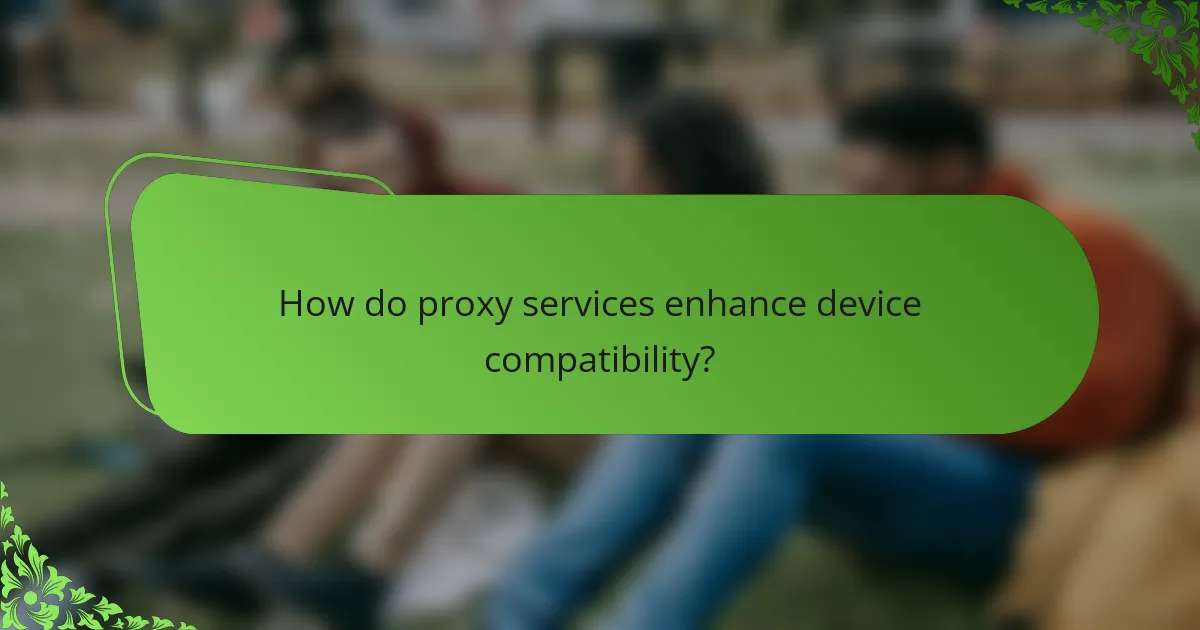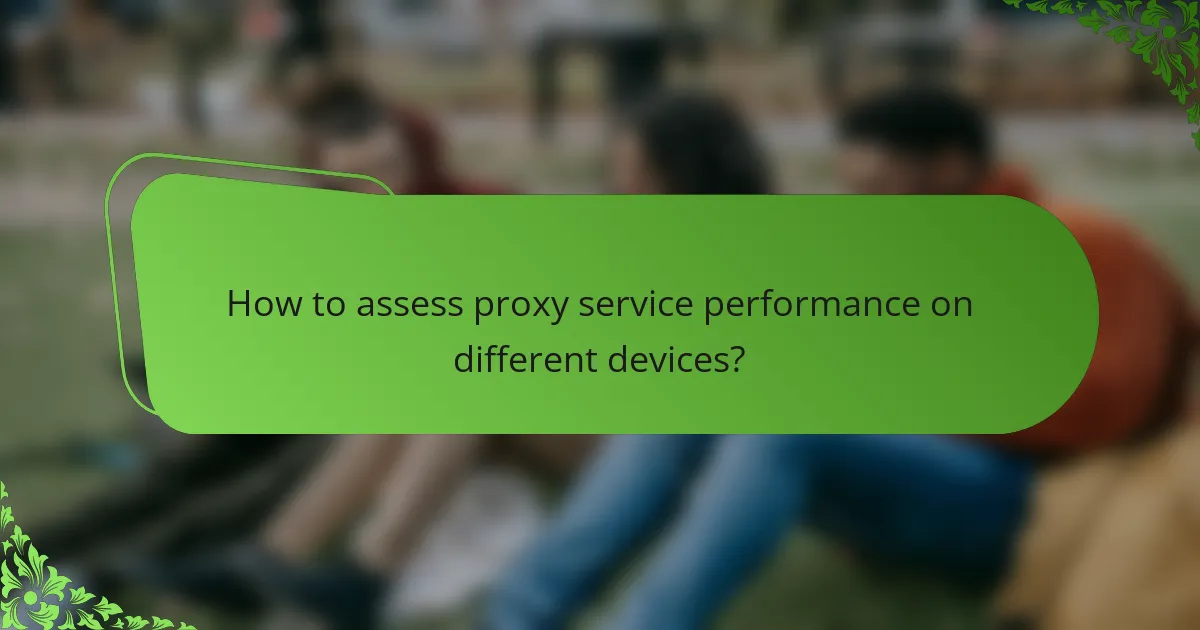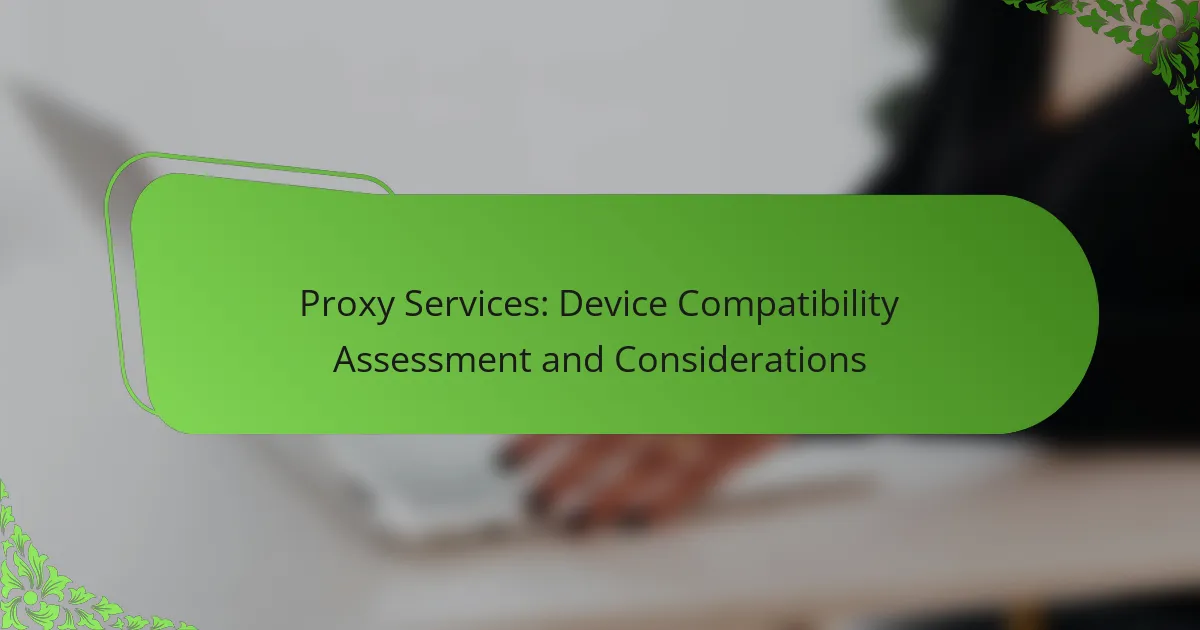Proxy services play a crucial role in enhancing device compatibility by enabling seamless access to online content across various platforms. By supporting multiple protocols and providing reliable connections, these services facilitate effective communication between devices and networks. Key considerations such as operating system support, browser compatibility, and security features are essential for ensuring optimal performance across diverse environments.

What are the best proxy services for device compatibility?
The best proxy services for device compatibility ensure seamless integration across various platforms and devices. They provide reliable connections, support multiple protocols, and offer features tailored to specific device needs.
Smartproxy
Smartproxy is known for its user-friendly interface and extensive device compatibility. It supports a wide range of devices, including smartphones, tablets, and desktops, making it versatile for different user needs.
With Smartproxy, users can access over 40 million residential IPs, which helps in bypassing geo-restrictions effectively. This service is particularly beneficial for mobile app testing and web scraping across various devices.
Bright Data
Bright Data, formerly known as Luminati, offers a robust proxy service with exceptional device compatibility. It provides access to a vast pool of IP addresses, allowing users to connect from different locations seamlessly.
This service is ideal for businesses that need to conduct market research or competitive analysis on various devices. Bright Data supports multiple protocols, ensuring that users can choose the best option for their specific device requirements.
Oxylabs
Oxylabs is a premium proxy service that excels in device compatibility, particularly for large-scale operations. It offers dedicated and residential proxies that work well across various devices, from smartphones to enterprise-level servers.
With features like real-time data gathering and a user-friendly dashboard, Oxylabs is suitable for businesses needing reliable connections for data extraction and analysis on multiple devices.
GeoSurf
GeoSurf is designed for users who require extensive geo-targeting capabilities across different devices. It provides a straightforward setup process and supports various platforms, ensuring compatibility with both desktop and mobile devices.
This service is particularly useful for marketers and advertisers looking to test campaigns in different regions. GeoSurf’s residential proxies allow users to access localized content effectively.
NetNut
NetNut offers a unique approach to proxy services by providing direct connections to ISP-level residential IPs. This ensures high-speed performance and excellent device compatibility across various platforms.
Ideal for businesses that require reliable data collection, NetNut supports multiple devices and is particularly effective for web scraping and market research. Its straightforward pricing model also appeals to users looking for cost-effective solutions.

How do proxy services enhance device compatibility?
Proxy services enhance device compatibility by allowing devices to connect through various IP addresses and protocols, ensuring seamless access to online content. This flexibility helps devices communicate effectively across different networks and geographical locations.
By providing diverse IP addresses
Diverse IP addresses enable devices to appear as if they are accessing the internet from different locations. This is crucial for bypassing geo-restrictions and accessing region-specific content, which can vary widely across countries.
For example, a user in the United States can use a proxy service to obtain an IP address from Europe, allowing access to European streaming services. This capability is particularly beneficial for businesses that operate globally and need to test their applications in various regions.
By supporting multiple protocols
Proxy services support various protocols, such as HTTP, HTTPS, and SOCKS, which cater to different types of internet traffic. This support ensures that devices can connect using the most suitable protocol for their specific needs, enhancing compatibility.
For instance, HTTPS is essential for secure transactions, while SOCKS is often used for applications requiring high performance. Understanding which protocol to use can significantly impact the efficiency and security of data transmission.
By ensuring location flexibility
Location flexibility is a key feature of proxy services, allowing devices to connect from virtually anywhere. This is particularly useful for remote work or accessing services that are restricted to certain geographical areas.
Businesses can leverage this flexibility to provide employees with access to internal resources while maintaining security. Additionally, individuals traveling abroad can use proxies to access their home content without restrictions, ensuring a consistent user experience regardless of location.

What factors should be considered for device compatibility?
Device compatibility for proxy services hinges on several key factors, including supported operating systems, browser compatibility, network speed and latency, and security features. Evaluating these aspects ensures that the proxy service functions effectively across different devices and environments.
Supported operating systems
When choosing a proxy service, check which operating systems it supports. Most services are compatible with popular systems like Windows, macOS, and Linux, but some may also offer support for mobile platforms such as iOS and Android.
Consider the version of the operating system as well. Older versions may not support newer proxy technologies, which could limit functionality. Always verify compatibility with your specific OS version before committing to a service.
Browser compatibility
Proxy services should work seamlessly with major web browsers, including Chrome, Firefox, Safari, and Edge. Some proxies may offer browser extensions that enhance usability, while others might require manual configuration.
It’s essential to test the proxy with your preferred browser to ensure that it handles web traffic correctly and does not interfere with browsing speed or security. Look for services that explicitly state compatibility with your browser version.
Network speed and latency
Network speed and latency are critical for a smooth browsing experience. A good proxy service should minimize latency, ideally keeping it in the low tens of milliseconds range. High latency can lead to slow loading times and frustrating user experiences.
When assessing a proxy, consider running speed tests to gauge performance. Look for services that provide a trial period, allowing you to evaluate speed and responsiveness before making a long-term commitment.
Security features
Security is paramount when using proxy services. Look for features such as encryption, support for secure protocols like HTTPS, and options for anonymous browsing. These elements help protect your data from potential threats.
Additionally, check if the service complies with relevant privacy regulations, such as GDPR for users in the EU. A reputable proxy service should clearly outline its security measures and privacy policies to ensure user trust.

How to assess proxy service performance on different devices?
To assess proxy service performance on different devices, start by evaluating speed, stability, and application compatibility. These factors are crucial for ensuring that the proxy meets your needs across various platforms.
Conduct speed tests
Speed tests are essential for determining how well a proxy service performs on different devices. Use reliable tools like Speedtest.net or Fast.com to measure download and upload speeds, as well as latency. Aim for low latency (typically under 50 ms) and high download speeds to ensure smooth browsing and streaming experiences.
When conducting speed tests, perform multiple tests at different times of the day to account for fluctuations in performance. This will give you a clearer picture of the proxy’s capabilities under various conditions.
Evaluate connection stability
Connection stability is vital for uninterrupted access to online content. Monitor how often the connection drops or experiences interruptions while using the proxy on different devices. A stable connection should have minimal disconnections, ideally less than a few times per hour.
Consider using tools that log connection stability over time, allowing you to identify patterns or specific times when the connection may falter. This information can help you choose a proxy service that consistently meets your needs.
Test with various applications
Testing the proxy service with different applications is crucial to ensure compatibility and performance. Use popular applications such as web browsers, streaming services, and gaming platforms to see how the proxy handles diverse traffic types. Pay attention to any issues like buffering or lag during usage.
It’s also beneficial to check for specific application settings that may enhance performance with the proxy. Some applications may require additional configuration to work optimally, so be prepared to adjust settings as needed.

What are the common challenges with proxy services?
Proxy services often face several challenges that can hinder their effectiveness. Key issues include IP bans and blocks, latency concerns, and compatibility with various devices and applications.
IP bans and blocks
IP bans and blocks occur when a website identifies and restricts access from specific IP addresses, often due to suspicious activity. This can severely limit the functionality of proxy services, as users may find themselves unable to access the desired content.
To mitigate the risk of IP bans, consider using rotating proxies that change IP addresses frequently. This approach helps distribute requests across multiple IPs, reducing the likelihood of detection and blocking.
Additionally, employing residential proxies can enhance anonymity, as these IPs are less likely to be flagged compared to data center proxies. Always monitor your proxy usage to identify any patterns that may lead to bans.










